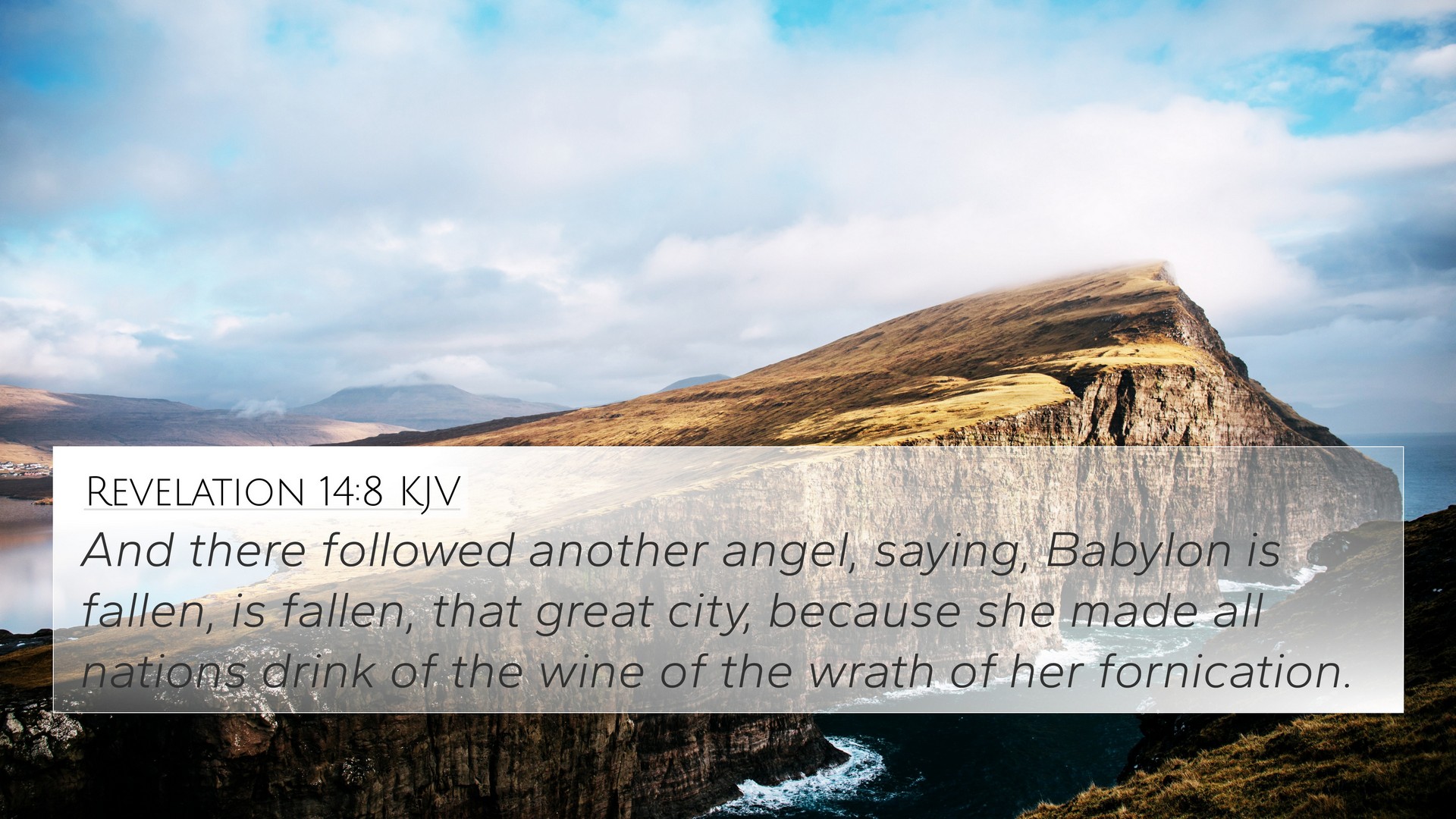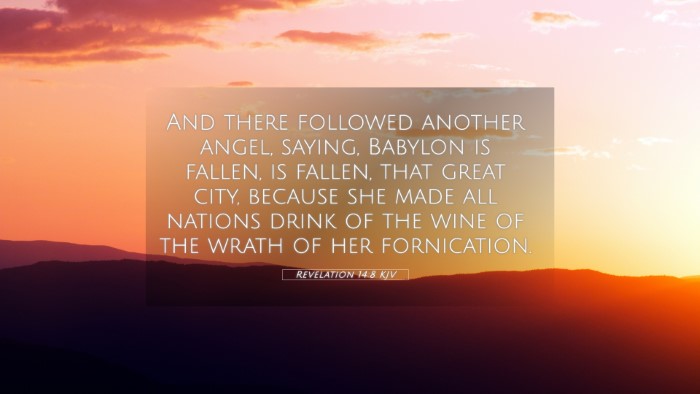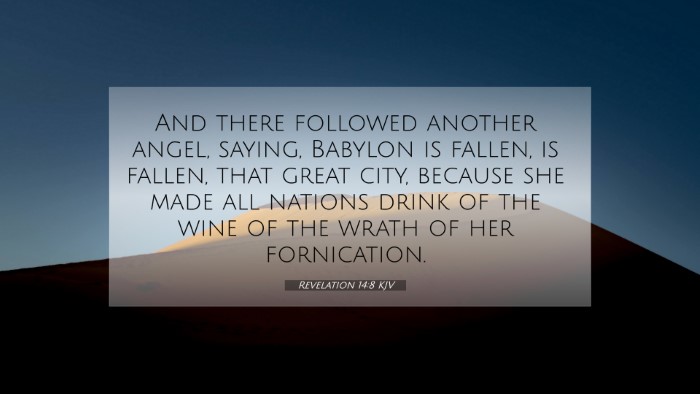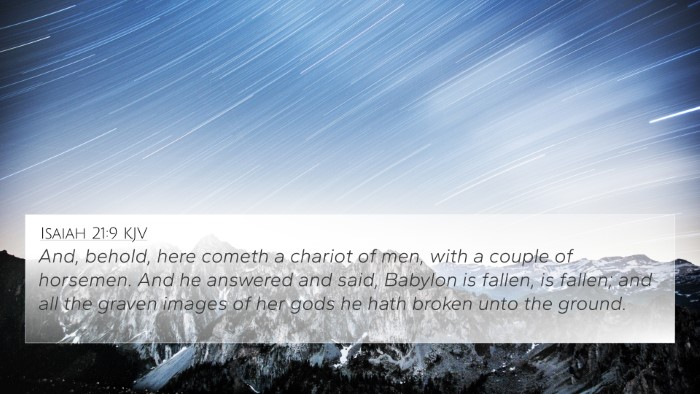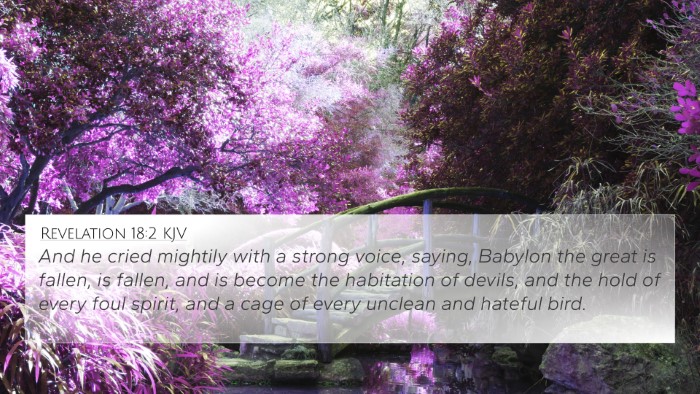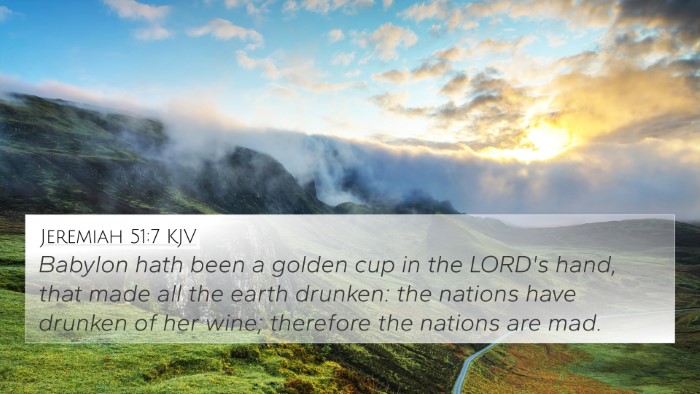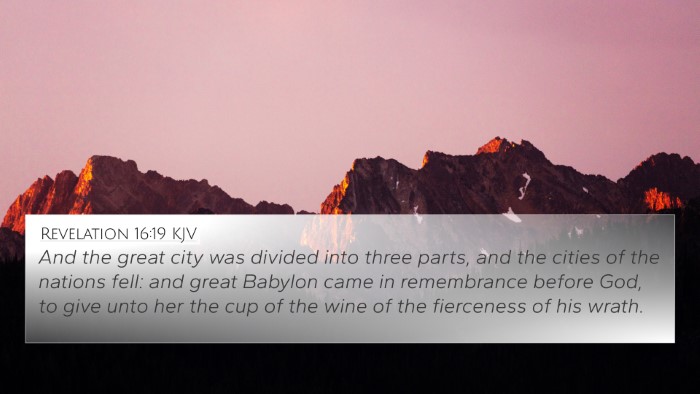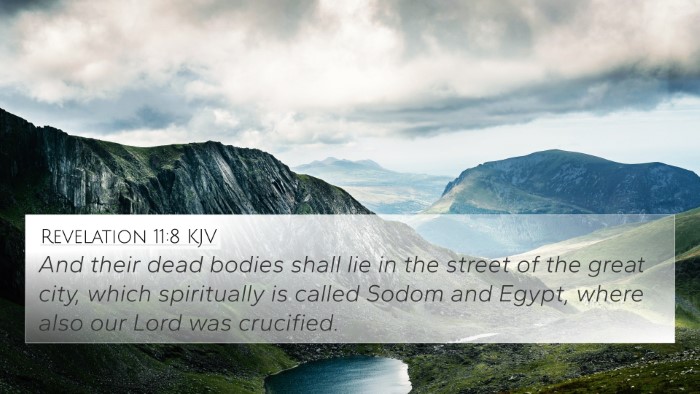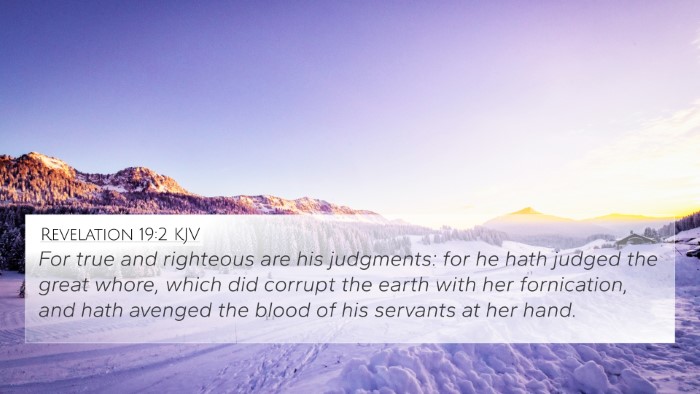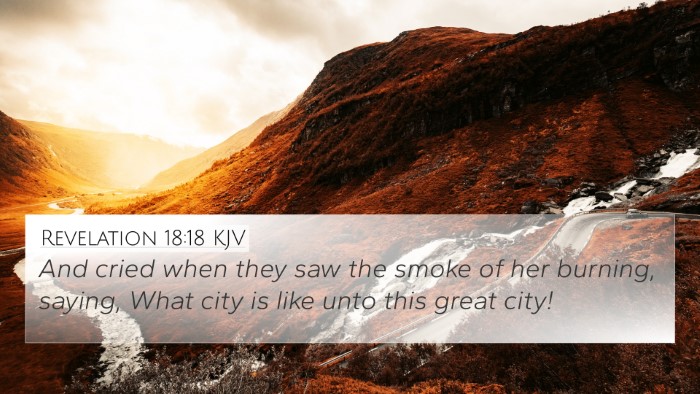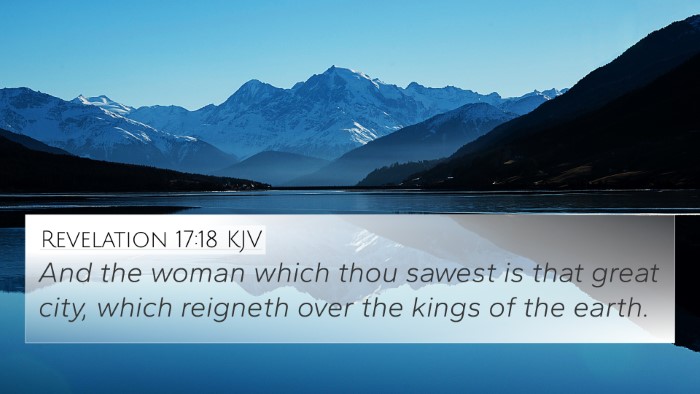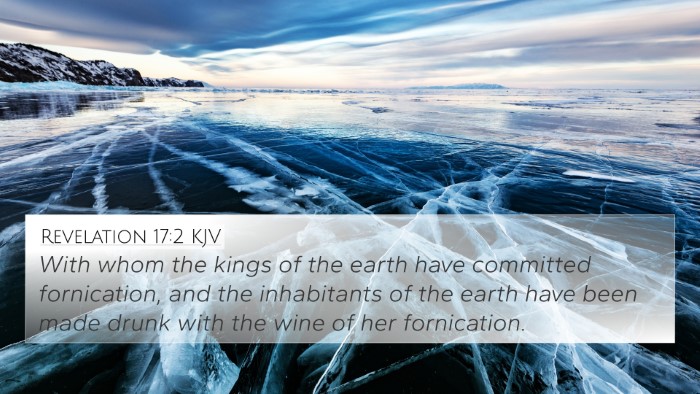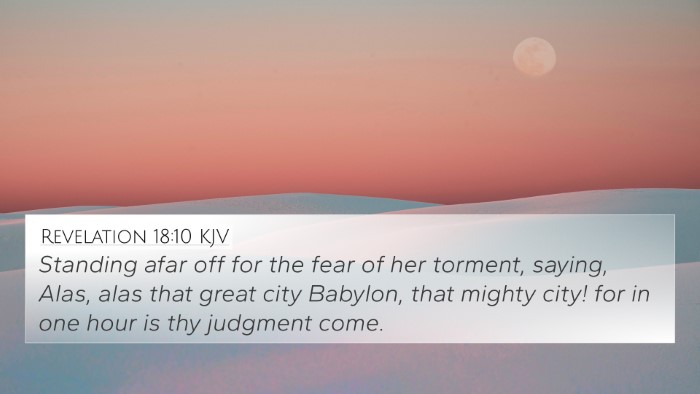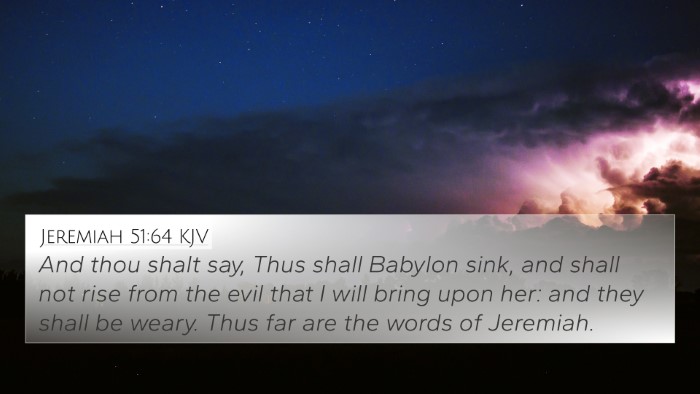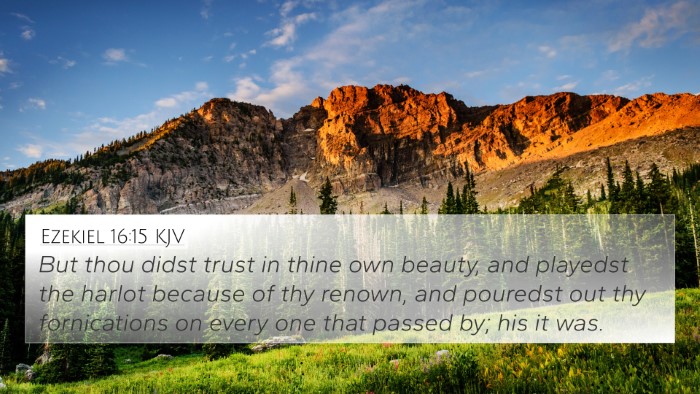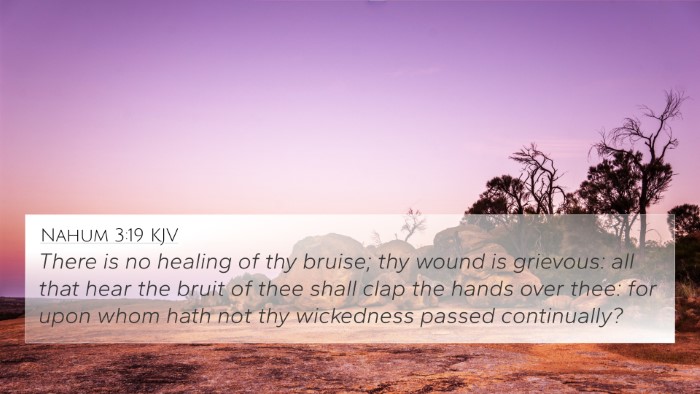Understanding Revelation 14:8
Revelation 14:8 states: "And there followed another angel, saying, Babylon is fallen, is fallen, that great city, because she made all nations drink of the wine of the wrath of her fornication."
This pivotal verse in the Book of Revelation signifies the fall of Babylon, often interpreted as a representation of worldly corruption and sin. The announcement of Babylon's fall is a key moment in the apocalyptic vision of John, where judgment is pronounced upon the city known for its excesses and immorality.
Commentary Insights
- Matthew Henry's Commentary:
Henry emphasizes the symbolic nature of Babylon as a representation of all that stands against God. The proclamation of its fall reflects God's judgment on sin and reminds believers of the consequences of turning away from divine paths.
- Albert Barnes' Notes:
Barnes highlights the significance of the fall being declared twice ("is fallen, is fallen"), suggesting a total and irreversible judgment. He posits that this echoes the prophetic warnings found throughout Scripture, signaling the end of a corrupt system that misleads nations.
- Adam Clarke's Commentary:
Clarke discusses the imagery of "wine of the wrath" as a metaphor for the intoxication of nations due to Babylon’s influence. It warns of the spiritual and moral degradation brought upon societies that accept and engage with such corruption.
Biblical Cross-References
Revelation 14:8 connects with several other verses throughout the Bible, providing deeper insights into its meaning. Here are some notable references:
- Isaiah 21:9: "And, behold, here cometh a chariot of men, with a couple of horsemen..." – This verse also references the fall of Babylon, underscoring the prophetic theme of divine judgment.
- Jeremiah 51:8-9: "Babylon is suddenly fallen and destroyed: howl for her; take balm for her pain..." – This passage resonates with the call to lament for Babylon's ruin, intensifying the understanding of its judgment.
- Daniel 4:30: "The king spake, and said, Is not this great Babylon, that I have built...?" – This highlights the pride and downfall associated with Babylon, aligning with the theme of human arrogance leading to divine retribution.
- Revelation 18:2: "And he cried mightily with a strong voice, saying, Babylon the great is fallen, is fallen..." – This repetition emphasizes the certainty of Babylon's demise and reinforces the prophetic messages surrounding it.
- 1 Peter 5:13: "...she that is in Babylon, elected together with you..." – This verse uses Babylon metaphorically to describe a place of spiritual harassment, suggesting the broader implications of the struggle faced by believers.
- Revelation 17:5: "And upon her forehead was a name written, MYSTERY, BABYLON THE GREAT..." – Here, symbolism is utilized to depict the enigmatic qualities of Babylon’s influence, connecting to its moral and ideological seduction.
- Luke 17:26-29: "Likewise also as it was in the days of Lot; they did eat, they drank..." – This reflects the societal decadence leading to judgment similar to what Babylon represents.
Connections Between Bible Verses
The intertextuality of Revelation 14:8 with other scripture emphasizes the recurring Biblical theme of judgment against idolatry and corruption. These connections between Bible verses illustrate a broader narrative concerning the downfall of those who oppose God's righteousness.
Thematic Bible Verse Connections
- Corruption and Judgment:
Verses like 2 Peter 2:4-6 highlight God's pattern of judgment against sin, paralleling the fall of Babylon with the judgment of Sodom and Gomorrah.
- The Appeal to Righteousness:
In contrast, verses such as Matthew 5:14-16 encourage believers to be lights in the world, opposing the darkness symbolized by Babylon.
- Warnings Against Seduction:
Proverbs 4:14-15 cautions against entering the path of the wicked, which reflects the spiritual warnings associated with Babylon's seductive nature.
Inter-Biblical Dialogue
Revelation 14:8 can be seen in ongoing dialogue with both the Old and New Testament. The repeated motifs of sin, judgment, and the call to righteousness bridge the texts across both covenants.
How to Use Bible Cross-References
Using tools for Bible cross-referencing such as a concordance or a cross-reference Bible study guide enhances understanding. By identifying connections like those found in Revelation 14:8, one gains a fuller picture of Biblical themes and messages.
Comprehensive Bible Cross-Reference Materials
Engaging with a variety of Bible reference resources allows for a more profound exploration of scripture. Detailed cross-references assist in discovering the interconnections within Biblical texts, creating a rich tapestry of theological insight.
Conclusion
In summary, Revelation 14:8 serves as a critical reminder of the consequences of spiritual defiance against God. Understanding this verse along with its Biblical connections enriches the interpretation and emphasizes the central themes of divine judgment, the fall of corrupt systems, and the call to maintain faith amidst worldly influences.
